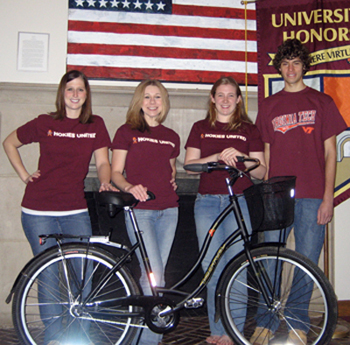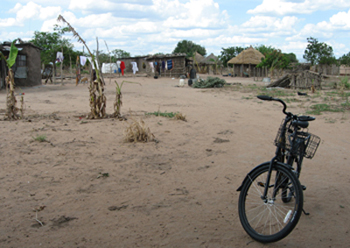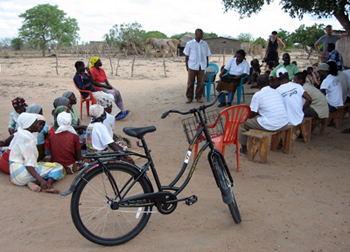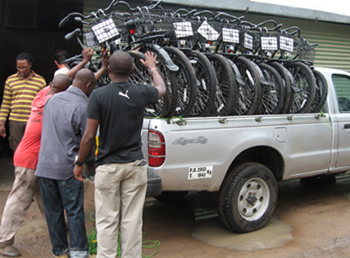 |
|
NO SMALL DEEDS: Hokie generosity helps Mozambique health care workers by DENISE YOUNG When public and international affairs graduate student Christine George teamed up with Kona Bikes and Bicycling Magazine to deliver the 106 bikes she and three other Tech students had raised money to donate, she knew their efforts--and the generosity of the Virginia Tech community--were changing lives. "I can still see the gathered men, women, and children singing and dancing in excitement around one of the donated AfricaBikes in a small, mud-hut village outside of Chokwe, Mozambique," George recalls. "Because of the simple generosity of others, there are 106 Kona AfricaBikes with VT stickers being ridden in sub-Saharan Africa by community health care workers, who are now able to visit more patients in a single day." |
 |
|||
This is where the Kona BikeTown Africa project enters the scene. Founded in 2005 by the Kona Bicycle Co., the Bristol Myers-Squibb Secure the Future Foundation, and Bicycling Magazine, the project aims to provide new, well-built, low-maintenance Kona AfricaBikes to home health care workers in sub-Saharan Africa to facilitate the treatment of HIV/AIDS patients. Since its inception, the program has donated 1,500 bikes, and its members have visited such countries as Namibia, Botswana, Senegal, South Africa, Mozambique, Tanzania, and Swaziland. "I wouldn't be surprised if the number of bikes donated surpasses 2,000 in 2009," predicts Keith Cozzens, public relations manager for Kona Bicycle Company and the Kona BikeTown Africa project. "Before the AfricaBikes were introduced into these areas, health care workers, who walk long distances and don't have access to reliable public transportation, were only visiting one patient a day. Now, they can see upwards of eight patients per day," says Cozzens. The organization has set up two ways to donate. The first is the Adopt-A-Bike program that allows people to donate money, starting at $100, which covers the cost of donating one AfricaBike. The second is to purchase an AfricaBike for personal use as part of the organization's Two-for-One program: for every two bikes sold to consumers throughout the world, Kona donates one bike to the BikeTown program. George, an honors student, became involved with the program in the spring of 2008, after learning about it from Christina McIntyre, associate director of University Honors, who had already purchased an AfricaBike for personal use. When George heard about the project, she knew she wanted to become involved. "Because of my past work in Mali, West Africa, I truly appreciated the large obstacles associated with access to health care in sub-Saharan Africa," says George. "I love the fact that we're raising money for something tangible," says senior biology major Corrine Watson, another honors student who helped with the project. "One hundred dollars equals one bike. It's that simple. That $100 covers everything." With the help of Watson and two other honors students, Jess Martin and Seth Barner, George, then a senior biology major, initiated a multifaceted effort that included speaking to local clubs, organizations, and businesses; presenting information about the program to classes and passing around a jar for donations; and setting up a table at a local elementary school 5K race, where students could get a firsthand glimpse at one of the bikes and make a donation, however small. "Donations ranged anywhere from one cent plopped in a donation jar by a young child, to the $1,000 given by alumna Patricia Caldwell, to $2,200 pooled together by the Wytheville Rotary Club," says George. Watson, assigned the task of approaching local businesses about donating, says she found the task more challenging than she had anticipated. "Many businesses had already finished their budgets for the year and said they did not have room to donate to anymore charities. The owner of PK's, however, surprised me by writing a check for a bike right then and there because she liked the program so much." In the end, they surpassed their initial goal of $10,000 to raise $10,600 for 106 bikes. The students also tried to increase awareness of the project's Two-for-One program by encouraging Virginia Tech students and faculty and staff members to make their next bicycle an AfricaBike, thus helping the project's goals and providing community members with an economical and eco-friendly form of transportation. George says that a crowning moment came for her when an elderly woman approached her outside of Chokwe, took her hand, and said, "Obrigada," which is "thank you" in Portuguese. "This is what our motto of Ut Prosim is all about--that we may serve others. But, for me, this statement is more than just a motto: it is a beautiful gift and a personal responsibility. There is still much work to be done," says George, who is already looking toward the future with another fundraiser in the works for the spring of 2009. "I hope this project continues," adds Watson, who hopes to visit Africa after attending medical school, when she can put her skills to use. "It is something to which anyone can contribute, and it doesn't take a lot to make a big difference. With just $100, someone can save hundreds, perhaps thousands, of lives." |
|||||||||||||||||||||||||
|
|
|
||
|
|
|||



